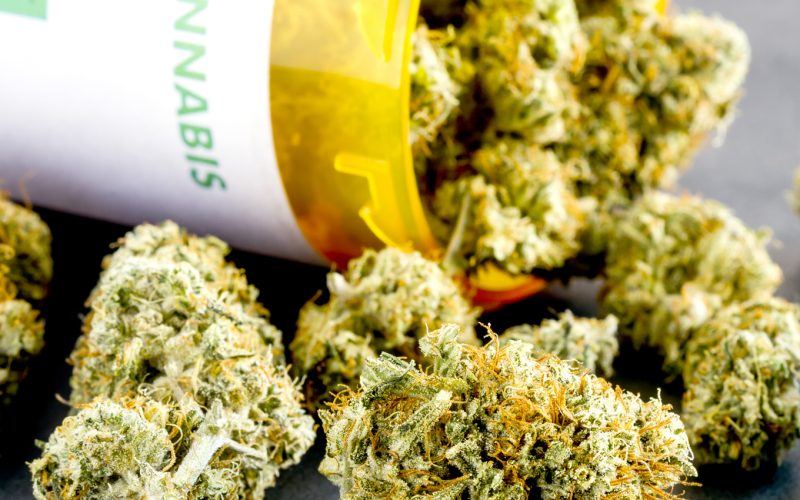
Arkansas Democrat-Gazette/STEPHEN B. THORNTON
Supporters of the Arkansas medical cannabis act, Issue 7, listen to a speaker during a rally outside the Arkansas Supreme Court Friday in Little Rock.
Editors Note: The Arkansas Supreme Court has denied the request for a rehearing for the Medical Cannabis Act, Issue 7, since the publishing of this article.
Last week in a 5-2 decision, the Arkansas Supreme Court invalidated more than 12,000 signatures for the Medical Cannabis Act ballot measure, known as Issue 7. Votes for the act will no longer be counted.
More than 100,000 early votes had already been cast when the Supreme Court invalidated Issue 7 on Oct. 27 for failure to comply with a 2015 law that set a variety of restrictions on paid canvassers, outraging supporters of medical marijuana — which is also referred to as cannabis. Many have said they early voted for 7 and against Issue 6, the Medical Marijuana Amendment, but would have voted for Issue 6 had they known 7 would have been struck down.
The decision leaves only Issue 6 on the ballot — although both issues will continue to appear on ballots through Election Day — which is a constitutional amendment that would allow for-profit dispensaries regulated by the Alcoholic Beverages Control Division. The amendment makes it much harder for the legislature to nix medical marijuana and offers an express route to implementing the drug compared to the act, but it also covers significantly fewer qualifying ailments compared to the act.
Issue 7 proponents petitioned for a rehearing Tuesday, Nov. 1. John Wesley Hall, attorney for the backers of Issue 7, filed the petition on the grounds the Supreme Court decision “infringes on the right of ‘the people’ to initiate laws unless they are well-financed” to meet the needs of the restrictions on paid canvassers. Rehearings are rarely granted.

Arkansas Democrat-Gazette/STEPHEN B. THORNTON
Supporters of the Arkansas medical cannabis act, Issue 7, cheer a speaker during a rally outside the Arkansas Supreme Court Friday in Little Rock.
“We are filing for a rehearing today because we believe sick and dying patients in Arkansas deserve to have an option to vote for a medical cannabis program that was designed for protecting patients,” said Melissa Fults, campaign director for Issue 7, in an official statement. “The Arkansas Medical Cannabis Act is patterned from a model similar to those already active within 25 other states, therefore, we are confident this will be a viable, flourishing program for communities in our state.”
Chief Justice Howard Brill and Justice Paul Danielson dissented from the decision, while Justices Karen Baker, Jo Hart, Rhonda Wood, Robin Wynne and Courtney Goodson all made the majority decision.
Some of the issues with the signatures gathered for Issue 7 were the canvassers didn’t get their mandatory police background check in 30 days before canvassing — some of which lied about getting one at all — and paid canvassers didn’t properly list a required home address and instead used businesses and P.O. boxes. All of the invalidated signatures left the ballot measure 2,465 signatures short of the 67,887 needed.
The Issue 7 sponsors, Arkansans for Compassionate Care, have stated their canvassers were all unpaid volunteers, which would exempt them from these restrictions. They also said they had many more signatures that weren’t counted by Secretary of State Mark Martin, who stopped counting once there were a sufficient amount of signatures, plus a cushion. Martin denied the group permission to gather more signatures following their official submission because he deemed the amount of submitted signatures to be valid enough to accept at the time.
Kara Benca, a Little Rock attorney, petitioned against Issue 7 to the Supreme Court. She challenged 17,746 signatures of the validated 77,516 by the secretary of the state. In a blog post on the Benca & Benca firm’s website, Patrick Benca said his firm accepted $30,000 from Issue 6 proponents to challenge Issue 7 because he believed Issue 6 ensured faster access to medical marijuana for patients, and feared Issue 7 would be delayed and eventually shut down because of its legal wording.

Staff Photo Nick Brothers
Supporters of the Issue 7 Arkansas Medical Cannabis Act protest with signs outside the Washington County Courthouse in Fayetteville Saturday, Oct. 29, following the Arkansas Supreme Court’s Decision to bar the ballot measure for failure to garner enough valid signatures.
“I believe that those out there that feel disenfranchised, hurt, confused, or angry, regarding why Issue 7 was taken off the ballot should look at the background of why we petitioned against it and why we support Issue 6,” Benca wrote. “For the sake of the patients, please vote for Issue 6. I assure you that our only concern is getting medical marijuana passed and to those patients as soon as possible.”
Justice Brill wrote the dissenting opinion in the Supreme Court decision, in which he claimed the burden of proof by Benca had not been met to prove the canvassers were paid, and only about 2,000 signatures were found invalid by Benca. The laws in place that restrict canvassers only apply to paid canvassers, and while it was unclear with those who had signed up to be paid volunteers were paid or not, many of them still volunteered to get signatures regardless of pay. He argued that by striking this ballot measure down, the court was infringing on the will of the people who signed the petition in good faith.
“While the sponsor’s canvassers did make some errors in the signature-gathering process, I agree with the master’s findings that these errors are not a complete failure with regard to the sufficiency of the signatures on the petition,” Justice Brill said in his dissent statement. “The proposed act should remain on the ballot. The people should be permitted to vote on the initiative on Nov. 8, and their votes should be counted.”










